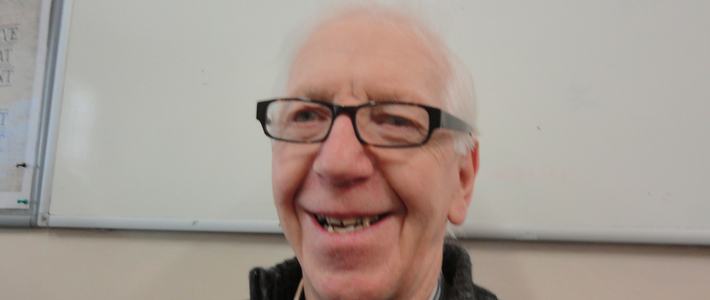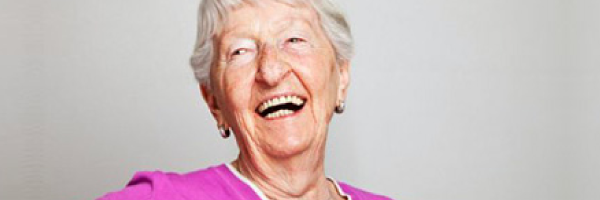SeniorLine’s Frank Cullinan – learning from life
Posted on 1st March 2018

Frank Cullinan’s volunteer muscle is very well developed. For over 50 years, he has been a swimming coach for children with disabilities. He is also a long-term badminton coach for young people from deprived areas where sport can offer a positive outlet. He has volunteered for Samaritans, and was involved for many years in raising funds and providing medicines for a project his sister ran in Colombia, South America.
One of the saddest calls he took with Samaritans was from a young professional woman who told him she had taken medication and would be dead within 30 minutes. Frank initially attempted to organise emergency help for her, but she did not want any intervention, and asked only if he would stay with her on the line. “I did and we talked, and finally the line went dead. I remember sitting and having tea with a supervisor who asked if I wanted to go home, but I wanted to finish my shift, which I did. Of course, I’ve never forgotten that call,” he said.
His reasons for giving his time freely arise from the ups and downs of his own life - ‘I’ve had to change shift a number of times’ he says, though any hardships on the way seem to have taught him compassion rather than cynicism. So when Frank saw in his church bulletin in Dalkey that SeniorLine needed volunteers, he immediately got in touch. “I had to leave the Samaritans because my job took me out of Dublin. I had been thinking of going back in recent years but I wondered about taking calls from people from Pakistan, India, China, all our young migrants, I wondered if I could deal with such cultural differences,” he said.
What was his most important learning in SeniorLine training? “I learnt to accept myself, there can be a denial about your age’ (Frank is 84 and looks years younger), ‘but looking round the room at the other people, I said ‘this is my group now’. The peer aspect of SeniorLine attracted. The most valuable thing I learned in training was the listening aspect of the service. Most people want to hop in and interrupt with their story”, he said.
Frank has a very simple philosophy on the line. “With all callers, including repeat callers, I ask them their name, tell them mine, and listen to anything they want to tell me. I don’t question whether they are gaining or losing. With some of our callers, I think we may be a last resource. If ever I am tempted to leave SeniorLine, (which I am not, I hasten to add), I think of the evening about five minutes before the lines closed, when a woman phoned and said ‘please don’t hang up’. She said she had not spoken to anyone for three days, and could not go to bed unless she talked to someone. I think we are a very valuable service. Even if I were to get only one call a night, that call would make it worthwhile. I would urge anyone who has true life experiences and who thinks about giving to consider becoming a SeniorLine volunteer,” he says.
“I notice most of our other volunteers have the same approach to listening, and you are either very good at selecting people or the right people select themselves. I find my colleagues also let the caller work towards their own solution, if there is a solution, and that is not always the case”.
Talking to callers throughout Ireland gives SeniorLine volunteers a unique insight into the lives of many older people. If Frank were Minister of State for Older People, what initiatives would be effect? “I would give every person a phone, with buttons that would put them in touch with a range of entitlements. I remember visiting my local Community Information Centre and getting literature on many services and entitlements, I had not known about. I would like our callers to have a television with a remote, a computer. It would be all about connecting older people with other,” he said. In the realms of fantasy, he would like to give all older people a better health service and better quality of life all round.
Frank has five adult children and 12 grandchildren. He was part of the SeniorLine group involved in a 2017 project, providing a listening line two evenings a week for students in DCU. It is an idea, he feels, with a lot of potential. “Young people have loads of doubts and fears. As older people, we have lots to offer them because we have been there before them and have been through many of the things they have not yet faced. I am not talking necessarily about academia. A lot of my knowledge comes from different sources -- from life,” he says.


